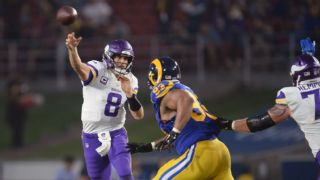|
LOS ANGELES -- The offensive showcase between the Minnesota Vikings and Los Angeles Rams is just the tip of the iceberg of a trend Kirk Cousins is experiencing through the first quarter of the season. Cousins and Jared Goff went a combined 59-of-83 passing for 887 yards, with eight passing touchdowns and no interceptions in their Thursday night shootout. This was the second game in NFL history to feature five 100-yard receivers (Adam Thielen, Stefon Diggs, Cooper Kupp, Brandin Cooks and Robert Woods), according to Elias. After his third straight game with 48 passing attempts or more, Cousins is on pace to break Matthew Stafford’s 2012 record of 727 passing attempts in a season by 29. And he’s already eclipsed several team records, having thrown the third-most touchdown passes (10) and the most passing yards by any Vikings quarterback (1,387) in the franchise’s first four games. Those numbers are great, but a look at the other side of the equation -- Minnesota’s inability to generate much from the run game -- points to a jarring imbalance on offense. Minnesota’s run game ranks 31st overall, accounting for just 68 yards on the ground each game, while its passing offense ranks fifth (372.2 yards per game). Cousins was electric in bouncing back from a horrendous performance against the Bills, recording his second 400-plus-yard passing game with at least three touchdowns in four weeks.  Game situations dictate how that balance will flow and whether passing numbers will appear particularly inflated in various circumstances. In Green Bay, the Vikings had no choice but to abandon the run as Cousins staged a thundering comeback in the fourth quarter and overtime to tie the Packers. They fell behind the Bills 17-0 after running six plays, and then Minnesota leaned entirely on its passing game. Cousins handed off the ball four times total in Week 3. Game situations dictate how that balance will flow and whether passing numbers will appear particularly inflated in various circumstances. In Green Bay, the Vikings had no choice but to abandon the run as Cousins staged a thundering comeback in the fourth quarter and overtime to tie the Packers. They fell behind the Bills 17-0 after running six plays, and then Minnesota leaned entirely on its passing game. Cousins handed off the ball four times total in Week 3.
Six of Minnesota's 11 drives resulted in touchdowns or field goals in Los Angeles, predicated on the shootout the Vikings found themselves engaged in after their defense allowed 38 points through the first three quarters. "We’re trying to do what we have to do to win," head coach Mike Zimmer said. "It’s not the offense’s fault that the other team goes down and scores quickly." The offensive imbalance might not be cause for sounding the alarm, but having to rely so heavily on the passing game might not be the best thing -- nor sustainable -- for the overall health of the offense. If Minnesota wants to take pressure off Cousins, getting Dalvin Cook back in his groove is one place to start. Not wanting Cook to reinjure his hamstring, the Vikings had the second-year back on a 15- to 20-play pitch count in Los Angeles. Cook took 18 snaps out of the backfield, registering 20 yards on 10 carries. After Cook was pulled in the first half, the Vikings ran a total of five times between Cousins scrambling, two rushes for Latavius Murray and one for rookie Roc Thomas. The hamstring injury that forced Cook to miss the Bills game might be holding this offense back from finding more of a balance. The run game concerns didn’t hinder what the Vikings were able to do elsewhere offensively, but they remain an issue. For a second straight week, Cousins was Minnesota’s leading rusher, the byproduct of two QB sneaks on fourth-and-1 and several runs once his pocket collapsed. The pass-heavy trend may eventually balance out if Minnesota can find ways to get Cook going and rely on contributions from its other running backs. Until then, Cousins is on pace to put up more big numbers, the only thing that’s giving the Vikings a chance on offense. "We moved the ball -- it is what it is," Cousins said. "We’ll certainly go back and look at what we can do better in all phases, but certainly with running the football."
|
